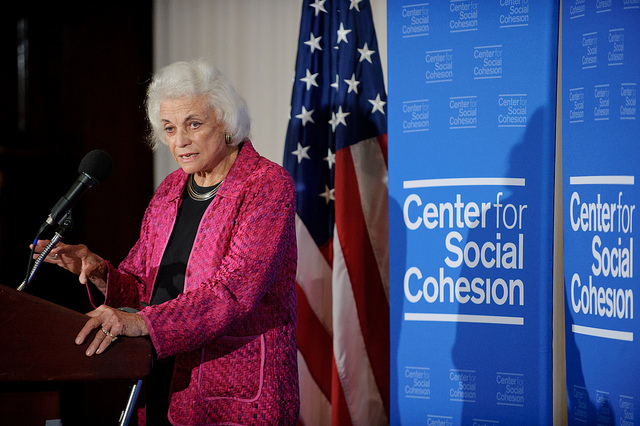
Retired Supreme Court Justice Sandra Day O’Connor has spent plenty of time thinking about the forces that unite and divide Americans as an attorney, Arizona state legislator and Supreme Court justice. At a conference titled “Can the United States Remain United?” hosted by Zócalo’s sister organization, the Center for Social Cohesion, O’Connor discussed how a society as diverse as the U.S. can come together.
Can the United States remain united? Well, I’d certainly hope so – I’m sure you do too! Now, many nation-states around the world are united by blood, or ethnicity, or religion, or historic territorial identity, or some other immutable characteristics. And the United States is different from most of those places, because it’s united based on none of those things, and all of them.
What do I mean? We have a unique conception of our role and ourselves, and our concept of citizenship is one that is open and voluntary. The people who became Americans came here because they wanted to, and they wanted to experiment on a new continent. And I think we have, from the beginning, we have placed value on freedom and democracy, and we look to our founding documents – the Declaration of Independence and the Constitution – for our guidance, and we’re united by a certain number of ideas that we think we share. There are other forms of unity of course, that are not what we’re putting forward – ethnicity, or race, or religion. And so we put those aside and reach for something else: it’s the relationship between the American identity and the various sub-identities that American citizens also hold that I think brings you here today to talk about it. And the sub-identities in our U.S. population capture only a part of what we are, and I guess the question we’re going to talk about today is whether the overlying identity as Americans, as citizens of this country, developed as it is, are sufficiently strong to overcome the divisions that we see based on the other issues that surround us today, and certainly, we have them.
And I hope the answer of course, is yes – we’ve said for years that our strength as a nation is founded on the strength of all the immigrants that came to this country. They brought diverse backgrounds, and they brought expertise from various parts of the world. They made our “melting pot” in our country. And we have a history that has certainly shown a number of failures in our ideals – the idea that we would’ve had slavery for as long as we did is rather amazing, considering what we thought we were doing. But I guess we got over that. We’ve had a lot of discrimination in this country as an outgrowth along with the slavery. We’ve had things like literacy tests for voting, and lots of other things. And many of the things we’ve experimented with are not designed to make people feel welcome and included.
Now some of these problems do continue today because of economic disadvantage, because of language issues and ethnicity. I live in the Southwest, and we have a great number of Hispanics living in the South West, in some areas more Hispanics than non-Hispanics. That certainly is true in southern California. So, how do we address that, and what is the dynamic today, and how do we handle it? I think we’ve had major issues in the country based on some of these concerns of language, ethnicity and class. So, we’re going to hear from a number of experts today to talk to us about these different aspects, and see what we do.
Now, I had a very simple solution – when I was in the legislature in Arizona and had a leadership position there – how could we reach accord in that group? And I’ll tell you what I did – it was pretty simple: I’d get everybody together and cook Mexican food, and we’d sit around outside and eat Mexican food, and drink beer, and make friends with each other. That worked.
So how as a nation can we sit around and eat Mexican food, and drink beer and make friends? That’s the question. If we can do that on a broader scale, I think we’ll come out of it all right, but I look forward to hearing some other ideas that aren’t quite as off-center as my own. And I will welcome the discussion, and take notes, and see if we can come up with some better solutions. Thanks for letting me be here.
Read “The Takeaway” from the Center for Social Cohesion conference.
Read Harvard Law professor Randall Kennedy’s remarks on cohesion.
*Photo by Sam Hurd




Send A Letter To the Editors